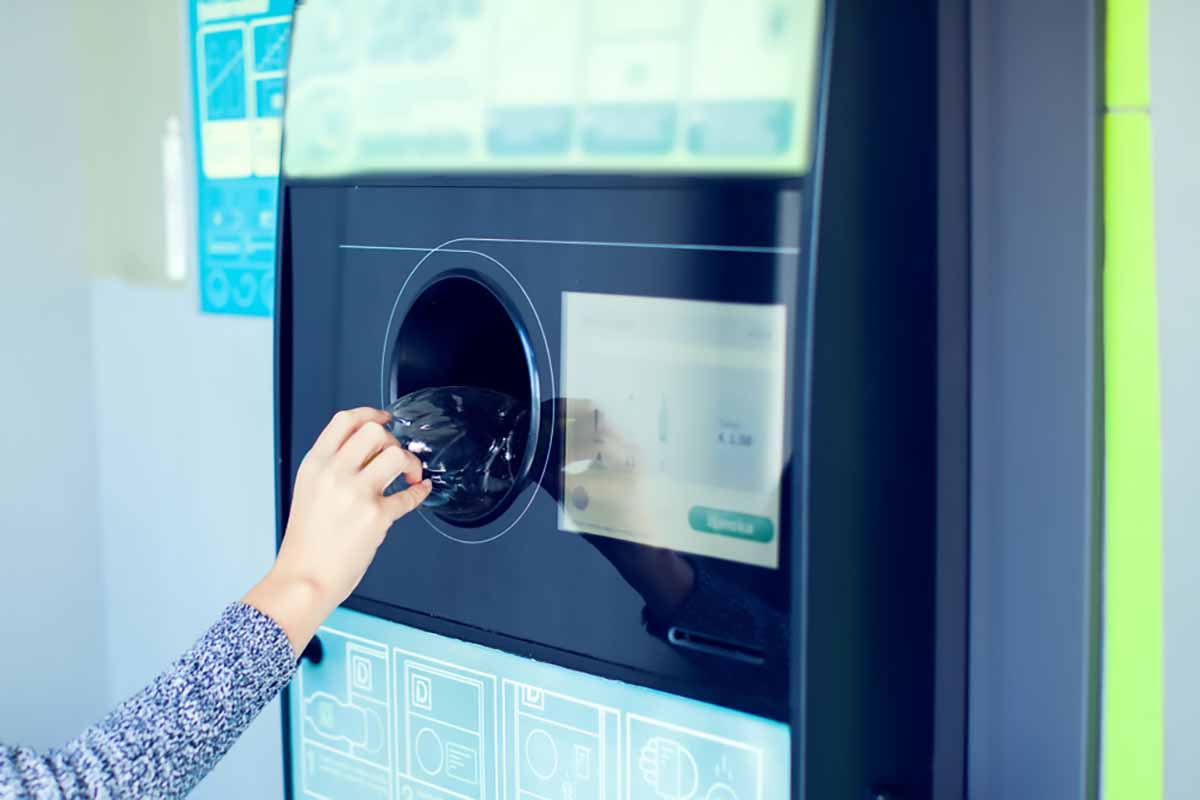
An expanded list of beverages will be covered in Connecticut’s bottle-deposit program under a new piece of legislation on the governor’s desk. | alexs333 / Shutterstock
Connecticut lawmakers passed legislation overhauling the state’s 41-year-old container deposit program, with one supporter calling the move the most significant U.S. bottle bill expansion in a decade.
Passed by the legislature last week, Senate Bill 1037 makes a number of significant changes to the state’s current container deposit program, including the following:
Expanding covered beverages: The deposit program currently covers beer and other malt beverages, mineral or soda water, carbonated soft drinks and waters. Starting on July 1, 2023, the program will be expanded to also cover hard cider, plant water or plant-infused drinks, juices, tea, coffee, kombucha and sports or energy drinks.
Exempting containers: The program currently exempts noncarbonated beverages of at least 3 liters and HDPE containers. The bill eliminates the HDPE exemption, sets a 2.5-liter exemption threshold for noncarbonated beverages, imposes a 3-plus-liters exemption for carbonated beverages, and exempts all containers of less than 150 milliliters. The legislation also allows smaller-volume bottlers to apply for exemptions.
Doubling the deposit: The legislation also increases the deposit from 5 cents to at least 10 cents, beginning in 2024.
Handling fee increases: Starting Oct. 1, 2021, the bill increases the handling fees that distributors must pay to retailers and redemption centers. The fee for beer and other malt beverages increases from 1.5 cents per container to 2.5 cents. The fee for noncarbonated beverages, mineral or soda water, and carbonated soft drinks increases from 2 cents to 3.5 cents. The bill also imposes a 2.5-cent fee on hard cider for the first time.
Who keeps unredeemed deposits: Under current law, unclaimed deposits are paid to the state’s general fund. The bill over the next four years allows beverage companies to keep larger and larger percentages of that money. Starting in the 2026 fiscal year, distributors will be allowed to keep 55% of the money. As a result, the state would experience a decrease of about $13 million per year in general fund revenues starting in 2026, according to a fiscal note.
Redemption space requirements: Starting Oct. 1, 2021, the bill requires certain retailers to install reverse-vending machines. It includes definitions specifying which retailers face this requirement. Some of those that aren’t required to install the RVMs must still set aside staffed areas where the public can redeem containers.
Wine and liquor bottle processing: The state’s deposit program doesn’t cover wine and liquor bottles, but Senate Bill 1037 requires the state to take steps to boost processing capacity for the containers. Specifically, the bill directs the state Department of Energy and Environmental Protection (DEEP) to develop memorandum of agreement (MOA) requirements for an in-state collection and recycling system that, by 2023, will process at least 80% of the wine and liquor bottles sold in the state. The system must produce furnace-ready cullet or post-consumer glass processed for use in cement, glass or fiberglass products. The DEEP commission is required to submit a draft of the MOA to state legislators by Jan. 15, 2022.
Approved stewardship organizations: The legislation also requires DEEP to approve one or more nonprofit stewardship groups to eventually take over the container redemption and recycling system. Beverage distributors would be required to join a stewardship group, and the groups would be required to submit statewide beverage container stewardship plans to DEEP by July 1, 2022. DEEP would then have three months to submit a recommendation to state legislators on whether to approve the stewardship plans. The change would shift Connecticut to a program management model somewhat like Oregon’s, where a beverage distributor-owned cooperative manages deposit and scrap collection for most containers in the state.
Nips surcharge: Starting Oct. 1, 2021, the legislation requires that consumers pay a 5-cent surcharge on liquid bottles of 50 milliliters or less, referred to as “nips.” Starting April 1, 2022, the money collected would be sent to municipalities where the bottles were sold. Municipalities would be limited to spending the money on solid waste reduction and anti-litter staffing and projects. According to the fiscal impact analysis, the surcharge would raise an estimated $620,000 a year for municipalities across the state.
On June 2, SB 1037 passed the Senate 33-1, with 2 senators absent and not voting. The following day, the House of Representatives then voted 105-42, with 4 members absent and not voting, to approve the bill that contained the Senate’s amendments. It now heads to the desk of Gov. Ned Lamont for his consideration.
The Container Recycling Institute (CRI), which advocates in favor of deposit laws, called the bill “the most significant bottle bill expansion legislation passed in the U.S. in about a decade.” CRI estimates that the provisions expanding the program to additional beverage types will boost the number of containers covered by deposits in Connecticut by about 13%.
According to BottleBill.org, a website maintained by CRI, Connecticut had a 44% redemption rate in 2020, down from 50% the year before. Connecticut’s rate is among the lowest for bottle bill states.
CRI hailed the deposit increase to 10 cents, bringing the Constitution State’s base-level deposit in line with those in Oregon and Michigan. Oregon’s redemption rate shot up after the state doubled its deposit from a nickel to a dime.
“While the COVID-19 pandemic played a part in declining redemption in 2020, the downward redemption trend over the last 10 years is unmistakable proof that 5 cents is no longer the financial incentive it once was for consumers to return containers instead of throwing them away or littering them,” Susan Collins, president of CRI, stated in a press release.
More stories about container deposits
- Bottle bill advocates take stock of wins, hurdles this year
- Study explores reusable containers in California DRS
- DRS program changes and delays